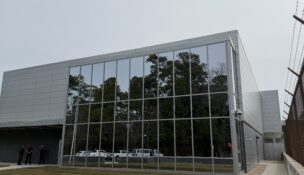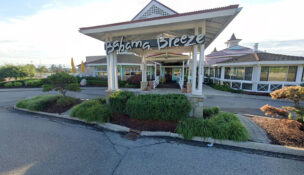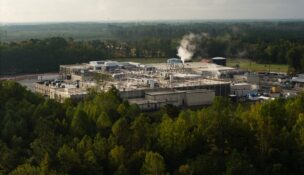Chesapeake Planning Commission recommends against data center
City Council to vote on 350,000-square-foot facility in June
Josh Janney //May 16, 2025//

A rendering prepared by Cox, Kliewer & Co. of the proposed data center in Chesapeake. Image courtesy City of Chesapeake

A rendering prepared by Cox, Kliewer & Co. of the proposed data center in Chesapeake. Image courtesy City of Chesapeake
Chesapeake Planning Commission recommends against data center
City Council to vote on 350,000-square-foot facility in June
Josh Janney //May 16, 2025//
SUMMARY:
- The Chesapeake Planning Commission voted 6-1 to recommend denying a rezoning request for a 350,000-square-foot data center in the Great Bridge area after strong opposition from local residents
- Concerns raised by residents included increased traffic, noise, light pollution, environmental impacts, proximity to homes and schools and opening the door to more large data centers in the area
- Developer Doug Fuller proposed the 35-foot data center on a 22.6-acre site, requiring a zoning change from agricultural to light industrial, with plans to employ 30-50 people and operate 24/7
- The commission cited a need for further study on the long-term impacts of the project and a desire to review a legislative report on the growing data center industry in Virginia
The Chesapeake Planning Commission voted 6-1 Wednesday night to recommend denial of a rezoning permit for a 350,000-square-foot data center in the Great Bridge area of Chesapeake. Hundreds of residents have passionately opposed the project.
The matter is expected to go before Chesapeake City Council in June.
Developer Doug Fuller, president of Emerald Lakes Estates, hopes to build the center on a 22.6-acre property on the west side of Centerville Turnpike, south of Etheridge Manor Boulevard. To do so, he needs the land rezoned from agricultural to light industrial.
If the project goes forward, the proposed 35-foot data center will have 30 to 50 employees and be manned 24 hours daily.
Before the meeting, Chair Joshua C. Gerloff said that the commission received a petition signed by almost 450 citizens opposing the data center. Commissioners also received 620 emails against the project and only seven in support and one person undecided.
Complaints included concerns about increased traffic, noise, light pollution, the site being too close to residential homes and schools, disruptions caused by construction, lack of sufficient public input, loss of agricultural land and green space, environmental concerns and fears that the center might cause blackouts, Gerloff said. Many voiced concern that the city’s first data center would open the doors to more data centers and other industrial development.
During a public hearing that lasted more than two hours, about 50 residents shared similar worries.
Chesapeake resident Catherine Gorman, who lives near the proposed site, said her family moved to the area for peace and that she would be “directly” affected by the data center if built.
“This is not just about a zoning decision,” Gorman said. “This is about the health, safety and quality of life of the families who live here. Do you have any independent studies on the environmental and health impacts of these large-scale data centers?”
Her husband, Ben Gorman, shared a similar sentiment, saying that neighboring residents would lose property values and deal with “the eyesore” that is the center. Resident Betty Ainspac urged the commission to delay the vote.
“There is no harm in waiting a little bit of time, gathering more information, because there is no putting this genie back in the bottle,” she said. “Once that data center is built, there is nothing you can do if it exceeds the noise levels. And no one in this area of Chesapeake, when they were shopping for a house, said, ‘Hey, honey, let’s buy the house that’s next to the building that’s the size of two Walmart supercenters.’”
Other residents feared the city’s power grid wouldn’t be able to sustain the center, although Fuller told the commission that Dominion Energy has enough power to run the data center and said the utility had agreed to provide up to 200 megawatts to support the facility.
Several commission members said they wanted more time to study the long-term impact of the data center on the city and also wondered if more compromises could be made with the project to make it more palatable to the community.
Some members said they also wanted to review a Joint Legislative Audit and Review Commission report on data centers from last year. The report shows that the unconstrained demand for power in Virginia would double within the next 10 years, with the data center industry being the main driver. The report also said one-third of data centers are located near residential areas, and industry trends make future residential impacts more likely.
“As the industry’s footprint in Northern Virginia grows, the amount of land ideal for data center development is decreasing, and developers are more likely to consider locations closer to residential and other sensitive areas,” the report said. “Additionally, the typical data center building is becoming taller, larger, and more power-intensive, which has the potential to make their industrial characteristics more pronounced and, depending on the design, could generate more noise.”
Ultimately, the commission voted 6-1 to recommend that the council deny rezoning approval, with Commissioner Michael L. Malone being the dissenting vote. Malone had put up a motion to delay the vote for 120 days so that the commission could have more time to get questions about the project answered, but his motion failed to pass.
Commissioners Nathaniel Williams and Jennifer Gilman were not present during the meeting.
Fuller did not immediately respond to requests for comment.
T

















